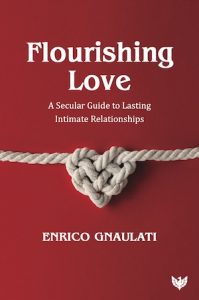
Enrico Gnaulati, PhD, is a clinical psychologist based in Pasadena, California, and Affiliate Professor of Psychology at Seattle University. He has authored many acclaimed books plus articles in academic journals and popular magazines, such as ‘The Atlantic’ and ‘Salon’. His work has been featured on various TV and public radio outlets, as well as reviewed in ‘Pacific Standard’, ‘Huffington Post’, and ‘The New Yorker’.
Enrico’s latest book, ‘Flourishing Love: A Secular Guide to Lasting Intimate Relationships’ draws on science, personal anecdotes, philosophy, and real-life interviews, to reveal the secrets to a lasting successful romantic union.
Conceiving of a book topic is one thing. Sustaining the motivation to see it through to completion is something entirely different. I know my writer self well enough to go out on a limb and say that to sustain the drive to take on a book project—Flourishing Love is my fourth—it has to tap a topic that I feel in my heart of hearts uncovers an unrecognized injustice, avoidable source of psychological harm, or untenable shibboleth. A topic that stirs fire in my belly.
In the case of Flourishing Love, the original wellspring of motivation to write it drew from how fortunate I feel for having weathered the ups and downs of my thirty-year-long marriage to enjoy its rewards in later years. The notion that at certain junctures had my wife and I succumbed to experiencing surmountable problems as insurmountable, and called it quits—the foreclosure of what nuptial joy we now jointly encounter—would have been nothing short of a tragic life mistake. It occurred to me there would be social value in a book that normalizes seemingly insurmountable marital problems and thereby spare the odd soul here and there who reads it the avoidable trauma of undoing a marriage that could still have a bright future.
So, from the outset, I wanted to write a book that was an affirmation of marriage, or long-term intimate partnership. I envisaged my readership to comprise spouses on the brink of ending their relationships who needed a reality check concerning realistic notions of the natural and expectable ups and downs, phase of life challenges, and romantic disillusionment all couples face, to avoid misconstruing unavoidable erosions in closeness as a sign of dire incompatibility. The book retained this focus but took on a higher purpose: a counter voice to the religious-moral cynics among us who steadfastly believe that ordinary human love is a feeble motivational source to inspire and re-inspire long-term romantic loyalty and commitment. It irked me to hear conservative social critics couple the rise in secularism with the declining rates of marriage and anti-natalism.
In essence, while knee deep in writing the book over the past three years, I realized there is a great need for a pro-marriage, long-term intimate partnership devoid of religious-moral baggage, that hitches itself to secular humanistic values. I wanted to detail how and why noble human virtues like benevolence, patience, fairness, loyalty, forgiveness, and humor, once they become well-refined habits of mind, are a far sturdier ballast for long-term flourishing love than standard moral-religious exhortations for couples to double down on self-sacrifice, duty, and Godly obedience. I wanted to offer a sober perspective on the myriad ways having and raising children can dismantle a marriage/long-term intimate partnership unless handled carefully; on the vital importance of sexual affection and intimacy; on the normalcy of sexual wanderlust; on priceless ways of communicating that bode well during conflicts and make or break a sense of emotional connection; on the invaluable role of humor to grease the wheel of affection. And, I wanted to source the best of what social science, philosophy, and literature have to offer to buttress my arguments.
intimate partnership devoid of religious-moral baggage, that hitches itself to secular humanistic values. I wanted to detail how and why noble human virtues like benevolence, patience, fairness, loyalty, forgiveness, and humor, once they become well-refined habits of mind, are a far sturdier ballast for long-term flourishing love than standard moral-religious exhortations for couples to double down on self-sacrifice, duty, and Godly obedience. I wanted to offer a sober perspective on the myriad ways having and raising children can dismantle a marriage/long-term intimate partnership unless handled carefully; on the vital importance of sexual affection and intimacy; on the normalcy of sexual wanderlust; on priceless ways of communicating that bode well during conflicts and make or break a sense of emotional connection; on the invaluable role of humor to grease the wheel of affection. And, I wanted to source the best of what social science, philosophy, and literature have to offer to buttress my arguments.
In the end, I wanted the book to be reassuring to those in need of reassurance in matters of love, challenge the extravagant expectations people put on marriage/long-term intimate partnership, and inspire those in hopeful romantic unions to stay the course and be more intentional in the way they speak, listen, and act with one another to bolster mutual happiness. I wouldn’t say Flourishing Love is a self-help book, but I would like to think reading it will have helpful effects!
Enrico Gnaulati
Buy your copy of ‘Flourishing Love: A Secular Guide to Lasting Intimate Relationships’ now!
